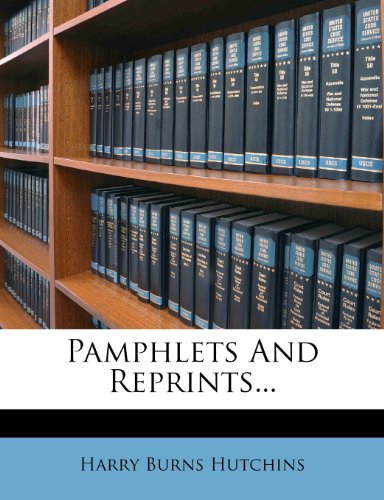Background
On April 8, 1847, Harry B. Hutchins was born in Lisbon, New Hampshire. He was the son of Carlton B. and Nancy Walker (Merrill) Hutchins.



(This is a reproduction of a book published before 1923. T...)
This is a reproduction of a book published before 1923. This book may have occasional imperfections such as missing or blurred pages, poor pictures, errant marks, etc. that were either part of the original artifact, or were introduced by the scanning process. We believe this work is culturally important, and despite the imperfections, have elected to bring it back into print as part of our continuing commitment to the preservation of printed works worldwide. We appreciate your understanding of the imperfections in the preservation process, and hope you enjoy this valuable book. ++++ The below data was compiled from various identification fields in the bibliographic record of this title. This data is provided as an additional tool in helping to ensure edition identification: ++++ Pamphlets And Reprints Harry Burns Hutchins
https://www.amazon.com/Pamphlets-Reprints-Harry-Burns-Hutchins/dp/1274732093?SubscriptionId=AKIAJRRWTH346WSPOAFQ&tag=prabook-20&linkCode=sp1&camp=2025&creative=165953&creativeASIN=1274732093
On April 8, 1847, Harry B. Hutchins was born in Lisbon, New Hampshire. He was the son of Carlton B. and Nancy Walker (Merrill) Hutchins.
His early education, received in seminaries at Tilton, N. H. , and Newbury, Vt. , was followed by his enrollment in 1866 in Wesleyan University, Middletown, Connecticut Ill health, however, prevented his pursuing the course there, though he spent some months in pre-medical studies at Vermont and Dartmouth. The following year, despite the distance from his native New England hills, he entered the University of Michigan, attracted by the presence on the faculty of a number of the authors of textbooks he had been studying. Following an undergraduate career of some distinction he received his diploma in 1871 on the occasion when President James B. Angell was inaugurated.
In 1872 in charge of the public schools of Owosso, Mich. , he returned to the University of Michigan in 1872 to become an instructor, and, the following year, assistant professor of history and rhetoric. Meanwhile he was studying law and in 1876 he resigned to become the partner of Thomas M. Crocker, of Mount Clemens, Mich.
Again recalled to the University in 1884, as Jay Professor of Law, Hutchins finally entered upon his long and distinguished career as an educator and administrator. Within three years he accepted an appointment as the first dean of the newly established law school at Cornell University. Legal education was entering a new phase; and when the position of dean of the law school at Michigan became vacant in 1895, he returned once more to Ann Arbor, charged with the inauguration of a three-year law course and the development of the case system of instruction. His achievements during the following fifteen years were such that he was twice called to serve as acting president of the University: once, in 1897-98, while President Angell was absent as minister to Turkey; and again, in 1909. When a permanent successor to Angell was sought in 1910, Hutchins proved the unanimous choice. He accepted with the understanding that he was to serve for five years, but was prevailed upon to continue in office until July 1, 1920, when he finally resigned. He passed his last years quietly in Ann Arbor.
The value of Hutchins' long administrative experience was immediately demonstrated when he became president, and the sound and constructive expansion of his administration marks an important period in Michigan's development. Despite some opposition, requirements were raised, special courses such as those in public health, aeronautics, and municipal administration, were established, and curricula in sanitary, automobile, and highway engineering, fine arts, and business administration were inaugurated. Advanced studies and research were encouraged through his strong support of the graduate school, which during these years became a separate administrative unit; his concern for student welfare led to the organization of a university health service; and the institution's educational obligation to the state was recognized in the development of extension courses.
In his relations with the people of Michigan upon whom the financial support of the University as a state institution rests, he was most fortunate; funds for many new buildings were appropriated; and the student enrollment was almost doubled. His emphasis upon the need of alumni cooperation as a supplement to the support derived from the state, has given Michigan a unique place among state institutions. Such benefactions as the Michigan Union, five women's dormitories, and the gifts to the law school by the late W. W. Cook were the direct results of his policy in this respect.
Professional and administrative labors left him small time for scholarly investigation. He published in 1894, however, an American edition of Joshua Williams' Principles of the Law of Real Property and, in 1895, Cases on Equity Jurisprudence, annotated five volumes of the reports of the Michigan Supreme Court, wrote a biography of Thomas M. Cooley, and was the author of many articles in legal journals. His public service also included the chairmanship of the committee on legal education of the American Bar Association, and membership as the American representative on the United States-Uruguay Treaty Commission. Throughout his life he retained many characteristics of his New England background.
(This is a reproduction of a book published before 1923. T...)
He was a strong, reliant, self-respecting personality, and his impressive bearing was sometimes the subject of affectionate undergraduate humor. To favored students and intimate associates, he revealed unaffected kindliness, tolerance, and human sympathy, illuminated by endearing flashes of shrewd Yankee humor.
December 28, 1872 Hutchins married Mary Louise Crocker, together they would adopt one son, Harry C. Hutchins.
